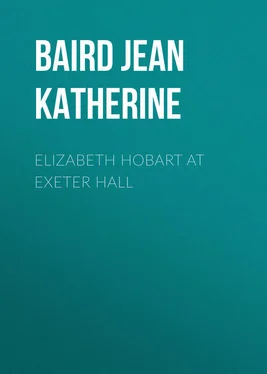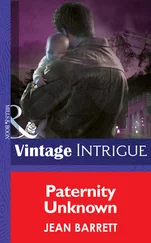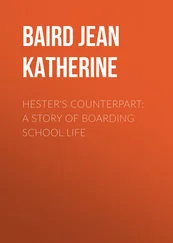Jean Baird - Elizabeth Hobart at Exeter Hall
Здесь есть возможность читать онлайн «Jean Baird - Elizabeth Hobart at Exeter Hall» — ознакомительный отрывок электронной книги совершенно бесплатно, а после прочтения отрывка купить полную версию. В некоторых случаях можно слушать аудио, скачать через торрент в формате fb2 и присутствует краткое содержание. Жанр: foreign_antique, foreign_prose, на английском языке. Описание произведения, (предисловие) а так же отзывы посетителей доступны на портале библиотеки ЛибКат.
- Название:Elizabeth Hobart at Exeter Hall
- Автор:
- Жанр:
- Год:неизвестен
- ISBN:нет данных
- Рейтинг книги:3 / 5. Голосов: 1
-
Избранное:Добавить в избранное
- Отзывы:
-
Ваша оценка:
- 60
- 1
- 2
- 3
- 4
- 5
Elizabeth Hobart at Exeter Hall: краткое содержание, описание и аннотация
Предлагаем к чтению аннотацию, описание, краткое содержание или предисловие (зависит от того, что написал сам автор книги «Elizabeth Hobart at Exeter Hall»). Если вы не нашли необходимую информацию о книге — напишите в комментариях, мы постараемся отыскать её.
Elizabeth Hobart at Exeter Hall — читать онлайн ознакомительный отрывок
Ниже представлен текст книги, разбитый по страницам. Система сохранения места последней прочитанной страницы, позволяет с удобством читать онлайн бесплатно книгу «Elizabeth Hobart at Exeter Hall», без необходимости каждый раз заново искать на чём Вы остановились. Поставьте закладку, и сможете в любой момент перейти на страницу, на которой закончили чтение.
Интервал:
Закладка:
“But he’s left the mining business. He’ll not trouble himself.”
“Not unless he sees more money in it. Matters have not been going his way lately. Someone has been dogging his steps, and his business is falling off. You know there’s really little money in that business if a man keeps within the law.”
“Well, I pity that man Hobart if your friend begins his work. Hobart’s a fine fellow, but is not accustomed to deal with men in the underbrush.”
“Hobart will take care of himself. He’s had his eye on – ”
At this moment the porter came to her assistance and Elizabeth heard no more. She wondered at their talk, but she was not uneasy. She had unbounded faith in her father, and felt that he would be able to protect and take care of himself under all circumstances. Entering the car, she deposited her sleeping burden on the seat. The others followed with the boy and the wraps.
Landis and Min had finished their lunch. There were several sandwiches, a chicken breast, half a bottle of olives, and cake untouched. This Landis gathered together in a heap in her napkin. She arose and leaned toward the window. As she did so, the lady with whom Elizabeth had been talking touched her on the arm. But it was too late. The contents of the napkin had at that moment gone out the window.
“I beg pardon,” she said, “I was about to ask you not to throw that good lunch away. There’s a woman, a foreigner, with her children in the rear of the coach, who has had nothing to eat.”
“I do not know that it is my place to provide it for her,” cried Landis, with a haughty toss of her head.
“I am sorry that you see the matter in that light,” was the rejoinder. “There are so many little mouths to be fed that I dislike to see good food wasted. Extravagance can be so extreme as to become a sin.”
“I do not know that it is anyone’s affair what I do with my lunch,” was the response.
The woman smiled, not at all affronted by the lack of courtesy shown her.
“I make many things my affairs,” she said sweetly. “I think it my duty when I see a girl as young as you doing what is not right to remind her, in a spirit of love and tenderness, of her error. I am sorry if my suggestion can not be received in the spirit in which it was given.” Then she went back to her place.
From the conversation of the two girls, Elizabeth caught such expressions as “that class of people,” “counting each penny,” “bound down by poverty,” and similar phrases.
The train had started on its way. A half-mile passed before it again slowed up. “This is Gleasonton,” said the lady, arising and coming to Mrs. Koons to assist her with the children. With a farewell nod and smile to Elizabeth, they quitted the car. From the window she saw them try to make their way through the crowd of loafers which had gathered about the platform. Suddenly a young colored boy in snuff-colored suit and high hat appeared. He immediately took charge of the children, and with them in his arms pushed his way to where a carriage stood at the curb, the women following close at his heels.
As the train pulled out, Elizabeth saw them bowling down the country road in a wide-open barouche, with coachman and footman in livery.
It was not long until the trainman called “Exeter!” Elizabeth gathered up her wraps and magazines. She knew that she might expect a carriage from the Hall at the station to meet the students.
Landis and Min had also gathered together their belongings. As the train drew into the station, they were first on the platform.
“There’s Jimmy Jordan!” they cried together, as a young colored boy with an expansive grin came up to take their luggage.
“Jimmy, how’s the Hall?”
Jimmy responded with a grin just a little more expansive than the previous one.
Elizabeth stood close at their side. “Are you from Exeter Hall?” she asked the boy. Having received an answer which she supposed an affirmative, she handed him her checks and the baggage which she carried in her arms. The girls whom the boy had addressed as Miss Kean and Miss Stoner led the way. Elizabeth followed at their heels, and in a few moments the three were being driven rapidly to Exeter Hall.
CHAPTER III.
THE DINNER EPISODE
A drive of several miles through a beautiful country brought them to their destination. Elizabeth was surprised, for neither her father nor mother had prepared her for the beauty of the place; a long stretch of campus, with great forest trees, beyond which were the tennis-courts and athletic fields; then the Hall itself. The original building was a large wooden mansion with wide porches and spacious rooms with low ceilings. But for years this had served as a home for the president of Exeter, the school itself having been removed to the newer buildings of gray stone.
The carriage passed through shaded drives which led to the front entrance. Arm in arm, groups of girls in white gowns were moving about or sat in little groups beneath the trees.
During the drive Elizabeth’s companions had chattered continuously. Elizabeth had paid little attention to them. Her eyes were on the new country about her.
“It must be nearly dinner-time,” exclaimed Landis, as the carriage turned in at the entrance to the campus. “The girls are all out. I hope we’ll be in time to go down with them. But we’ll have to go in and do the ‘polite’ with Miss Morgan.”
“Nora O’Day is back,” exclaimed Miss Kean. “Isn’t that she out there on the campus with Mary Wilson?”
“It can’t be. Mary Wilson and she were never friends.” As she spoke, Landis leaned eagerly from the window to get a view of the campus. “It can’t be Miss O’Day,” she repeated. “She and Mary are not the same style at all.”
“I think Miss O’Day’s swell looking. Don’t you?”
“She has plenty of money and knows how to dress,” was the rejoinder.
They had reached the entrance door. Jimmy Jordan, who appeared to be general utility boy, dismounted to open the door for them. Then he led the way into the great hall and on to the office, throwing open the doors before him with energetic officiousness, giving one the impression that he was the most important personage at Exeter Hall.
On entering the office, a woman advanced to shake hands with Miss Stoner and Miss Kean. With a few words of greeting, she dismissed them each with a bunch of jangling keys, and the information that they were to occupy the same rooms as the previous year. Then she turned to Elizabeth. “This is Miss Hobart?” she said, shaking her hand cordially, and drawing her forward to a chair. “Your father wrote me that you would arrive to-day. Jordan,” to the boy who stood grinning at her side, “Miss Wilson is somewhere on the campus. Ask her to step to the office, please. Miss Wilson will be your roommate. She will take charge of you. If you will excuse me, I’ll return to work which claims me.” She turned to her desk and was soon absorbed in correspondence.
Elizabeth was thus given an opportunity to study her. She was a tall woman, so tall and slender that these qualities first impressed those who saw her. Yet later, when one stood beside her, you discovered to your surprise that she was merely the average woman in height. It had been her carriage, her manner of holding her head, which gave the impression of unusual height. One might have thought her critical and stern had it not been that the expression of her eyes, which were gray and unusually large, was gentle and shy. Her well-shaped head was crowned with coils of brown hair touched with gray drawn loosely back from a broad, low forehead. She was a woman who could not pass unobserved in a crowd, yet she was not beautiful. It was that her presence was felt, rather than she herself observed. She had said little to the new student; yet the direct effect of her presence caused Elizabeth to be glad she had come to Exeter.
Читать дальшеИнтервал:
Закладка:
Похожие книги на «Elizabeth Hobart at Exeter Hall»
Представляем Вашему вниманию похожие книги на «Elizabeth Hobart at Exeter Hall» списком для выбора. Мы отобрали схожую по названию и смыслу литературу в надежде предоставить читателям больше вариантов отыскать новые, интересные, ещё непрочитанные произведения.
Обсуждение, отзывы о книге «Elizabeth Hobart at Exeter Hall» и просто собственные мнения читателей. Оставьте ваши комментарии, напишите, что Вы думаете о произведении, его смысле или главных героях. Укажите что конкретно понравилось, а что нет, и почему Вы так считаете.












